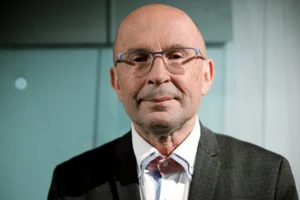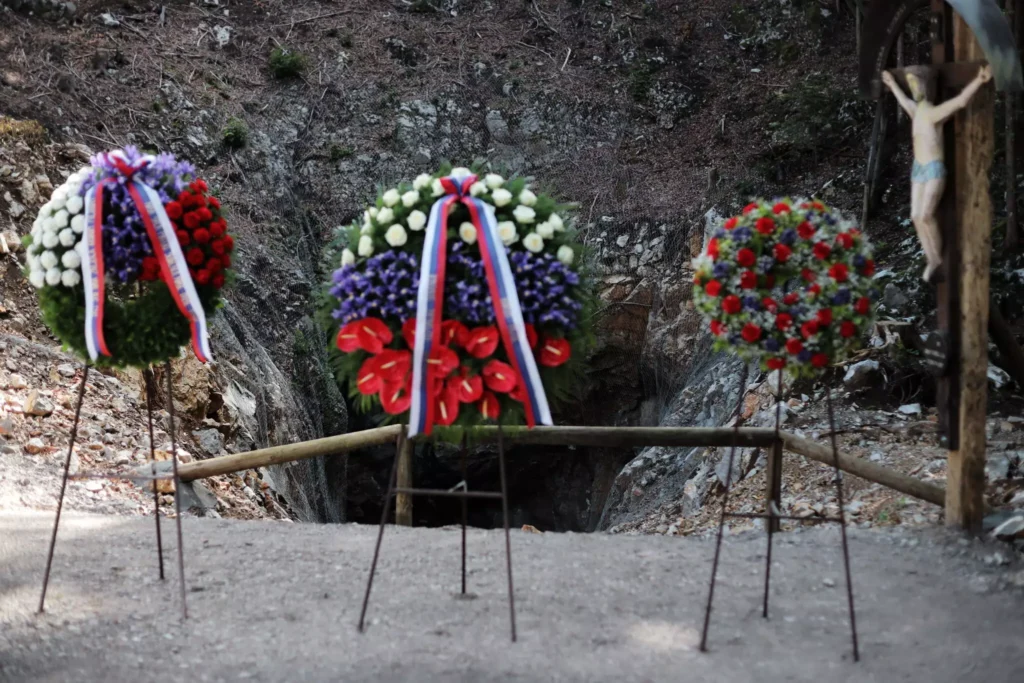“These are historical facts that must be remembered. There are dead people who must be buried. And there are criminals who must be convicted. And that is how it will always be. They cannot change this, so we sympathise with them and wait for better times, which will undoubtedly come. All the angry outbursts against the right wing are just frenzied reactions to the resolution of the European Union. It is a matter of complete despair and admission of defeat,” says historian Jože Dežman regarding the day of remembrance for the victims of totalitarianism.
On Saturday, the 23rd of August 2025, we marked the European Day of Remembrance for Victims of Totalitarian and Authoritarian Regimes (officially the European Day of Remembrance for Victims of Stalinism and Nazism), which has also been named International Black Ribbon Day. It is a day of Europe-wide remembrance of the victims of totalitarian dictatorships in 20th-century Europe, particularly communism, Nazism, and fascism. In April 2009, the European Parliament, with the support of the European People’s Party (EPP), the Alliance of Liberals and Democrats for Europe (ALDE), the Greens/European Free Alliance, and the Union for Europe of the Nations (UEN), adopted a resolution declaring this holiday throughout the European Union.
The Nazi-Communist agreement on the division of Eastern Europe
The 23rd of August was chosen as the date for the day of remembrance because it coincides with the signing of the Molotov-Ribbentrop Pact, in which Nazi Germany and the Communist Soviet Union signed an agreement on the mutual division of Eastern Europe. In Slovenia, the condemnation of Nazism and fascism is widely accepted. However, the condemnation of communism is more controversial.
In the past, attempts were made to confirm support for the EU resolution in the Slovenian parliament, but so far, this has been unsuccessful. Similarly, the burial of the Roma people from Iška, who were killed in the revolution, at the Žale cemetery in Ljubljana has been rejected several times. The issue is so pressing that the European Parliament had to draw attention to the unresolved problem in Slovenia with a special resolution.
Some media outlets did report on the recent day of remembrance. Radio Ognjišče, for example, reported that the New Slovenia party (Nova Slovenija – NSi) laid a wreath at the monument to the victims of all wars in Congress Square in Ljubljana. Member of the European Party of the Slovenian Democratic Party (Slovenska demokratska stranka – SDS), Dr Milan Zver, also spoke out, emphasising in his statement that reconciliation is not built on forgetting, but on truth.
Croatia: solemn burial of 814 victims; Slovenia: Speaker of the National Assembly warns against the “far right”
The 24ur news portal, meanwhile, highlighted the words of the Speaker of the National Assembly, Urška Klakočar Zupančič, who warned against the rise of the “far right.” Communism and socialism were not specifically condemned. Nor were they condemned by the media outlet N1. The MMC web portal of the national media outlet, Radio-Television Slovenia (RTVS), also did not specifically condemn revolutionary crimes. In Croatia, however, the holiday was taken more seriously (including at the political level) – among other things, 814 victims of mass killings during and after World War II, exhumed from the Jazovka pit, were finally buried.
Commentary by historian Jože Dežman:
“This silence on the part of the authorities on the day of remembrance is quite sufficient. However, if we compare this with Croatia, we can now see a tectonic shift there – they have begun to bury the dead. Those exhumed from the Jazovka pit lay there for many years, just as the victims do here. But there, the political decision has now changed, and everyone has unanimously spoken out against all three totalitarian regimes. And that is what I would expect in Slovenia as well – the minimum standard of consensus is to condemn the crimes of all totalitarian regimes.

But here, when it comes to condemning Aleš Štrancar while not condemning the “death to Janez Janša” calls, you can clearly see where we are. And I fear that what is called Kučanism or neo-Stalinism or even Golobism (in a new form) is actually holding us back in our development. If you don’t have your head in order, you can’t function or live normally. This shameful silence (an attempt to forget) proves that they still live in some hope that everything they deny does not exist. But all these things do exist.
These are historical facts that must be remembered. There are dead people who must be buried. And there are criminals who must be convicted. And that is how it will always be. They cannot change this, so we sympathise with them and wait for better times, which will undoubtedly come. All the angry outbursts against the right wing are just frenzied reactions to the resolution of the European Union. It is a matter of complete despair and admission of defeat. We can see how Oto Luthar and Božo Repe have now proven that they were never serious scientists (with their outbursts).
Repe in the Mladina magazine – writing that communists are not to blame for everything. Even worse was Luthar in the newspaper Dnevnik. Both oppose Tine Hribar, who is calling on Milan Kučan to approve the funeral. Here we see that the EU resolution has triggered deep depression and despair. No matter how they turn, it doesn’t work for them. Taboos, mythomania, it’s a lost cause. And if it was lost in the old days, when it was guarded by the Directorate for State Security (UDBA) and the League of Communists of Yugoslavia, how could it not be lost now, when it is guarded by such crooks as Premk and others. Mentally poor and ignorant. Barbarians, in fact.”
Domen Mezeg


